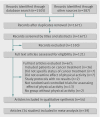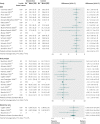Physical activity for cancer survivors: meta-analysis of randomised controlled trials
- PMID: 22294757
- PMCID: PMC3269661
- DOI: 10.1136/bmj.e70
Physical activity for cancer survivors: meta-analysis of randomised controlled trials
Abstract
Objective: To systematically evaluate the effects of physical activity in adult patients after completion of main treatment related to cancer.
Design: Meta-analysis of randomised controlled trials with data extraction and quality assessment performed independently by two researchers.
Data sources: Pubmed, CINAHL, and Google Scholar from the earliest possible year to September 2011. References from meta-analyses and reviews.
Study selection: Randomised controlled trials that assessed the effects of physical activity in adults who had completed their main cancer treatment, except hormonal treatment.
Results: There were 34 randomised controlled trials, of which 22 (65%) focused on patients with breast cancer, and 48 outcomes in our meta-analysis. Twenty two studies assessed aerobic exercise, and four also included resistance or strength training. The median duration of physical activity was 13 weeks (range 3-60 weeks). Most control groups were considered sedentary or were assigned no exercise. Based on studies on patients with breast cancer, physical activity was associated with improvements in insulin-like growth factor-I, bench press, leg press, fatigue, depression, and quality of life. When we combined studies on different types of cancer, we found significant improvements in body mass index (BMI), body weight, peak oxygen consumption, peak power output, distance walked in six minutes, right handgrip strength, and quality of life. Sources of study heterogeneity included age, study quality, study size, and type and duration of physical activity. Publication bias did not alter our conclusions.
Conclusions: Physical activity has positive effects on physiology, body composition, physical functions, psychological outcomes, and quality of life in patients after treatment for breast cancer. When patients with cancer other than breast cancer were also included, physical activity was associated with reduced BMI and body weight, increased peak oxygen consumption and peak power output, and improved quality of life.
Conflict of interest statement
Competing interests: All authors have completed the ICMJE uniform disclosure form at
Figures






Comment in
-
Physical activity for cancer survivors.BMJ. 2012 Jan 30;344:d7998. doi: 10.1136/bmj.d7998. BMJ. 2012. PMID: 22294755 No abstract available.
-
Exercise programs for patients with cancer improve physical functioning and quality of life.J Physiother. 2013 Mar;59(1):57. doi: 10.1016/S1836-9553(13)70150-4. J Physiother. 2013. PMID: 23419919
References
-
- Rolke HB, Bakke PS, Gallefoss F. HRQoL changes, mood disorders and satisfaction after treatment in an unselected population of patients with lung cancer. Clin Respir J 2010;4:168-75. - PubMed
-
- Muraca L, Leung D, Clark A, Beduz MA, Goodwin P. Breast cancer survivors: taking charge of lifestyle choices after treatment. Eur J Oncol Nurs 2011;15:250-3. - PubMed
-
- Servaes P, Verhagen C, Bleijenberg G. Fatigue in cancer patients during and after treatment: prevalence, correlates and interventions. Eur J Cancer 2002;38:27-43. - PubMed
-
- Young KE, White CA. The prevalence and moderators of fatigue in people who have been successfully treated for cancer. J Psychosom Res 2006;60:29-38. - PubMed
-
- Sekse RJ, Raaheim M, Blaaka G, Gjengedal E. Life beyond cancer: women’s experiences 5 years after treatment for gynaecological cancer. Scand J Caring Sci 2010;24:799-807. - PubMed
